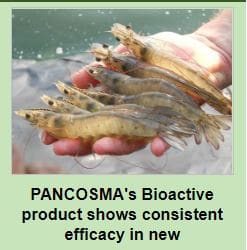PANCOSMA’s bioactive product shows consistent efficacy in new Enterocytozoon Hepatopenae trial in shrimp
Shrimp farming tends to be more and more industrialized and intensive in order to reach higher levels of production. However high stocking densities, high food inputs and low water quality stimulate the selection of opportunistic pathogens and may increase the risk of disease outbreaks. Among the most serious one are the White Feces Disease (WFD) and the Enterocytozoon Hepatopenaei (EHP). These two diseases are known to severely affect shrimp intestinal epithelium and digestive organs like the hepatopancreas. To limit these outbreaks, good management practices at the hatchery and at the pond are considered as the most efficient technics. However they are often not rigorously followed and diseases are common at the farm level.



